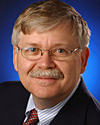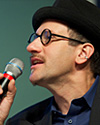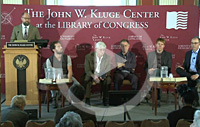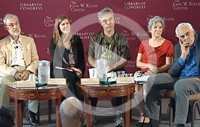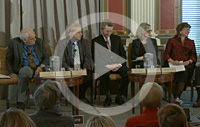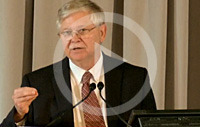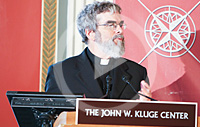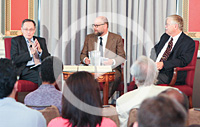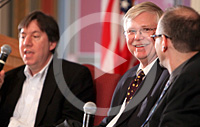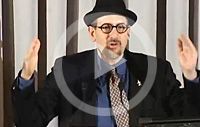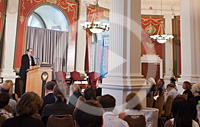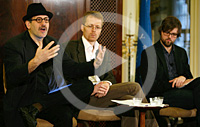
Current Chair
Lucianne Walkowicz - Fifth Chair in Astrobiology (2017-2018)

Lucianne Walkowicz is an astronomer at the Adler Planetarium, in Chicago, where she studies stellar magnetic activity and its influence on planetary habitability, using data from NASA’s Kepler Mission. As the fifth Baruch S. Blumberg NASA/Library of Congress Chair in Astrobiology, she began her tenure October 1, 2017, and will be in residence for 12 months. Walkowicz will work on a project titled “Fear of a Green Planet: Inclusive Systems of Thought for Human Exploration of Mars.” The project is designed to create an inclusive framework for human exploration of Mars, a vision that encompasses both cutting-edge research on Mars as a place of essential astrobiological significance, and that weaves in lessons from the diverse histories of exploration on our own planet. Read announcement
Past Chairs
Luis Campos - Fourth Chair in Astrobiology (2016-2017)
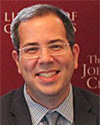
A historian of science, Luis Campos began on October 3, 2016 as the fourth Baruch S. Blumberg NASA/Library of Congress Chair in Astrobiology at The John W. Kluge Center. As Astrobiology Chair, Campos used the Library’s collections to examine the intersection between astrobiology and synthetic biology. His analysis explores the historical and emerging contemporary connections between two of today’s most compelling fields of research in the contemporary life sciences. Campos is currently associate professor of history at the University of New Mexico. Read announcement
Nathaniel Comfort - Third Chair in Astrobiology (2015-2016)
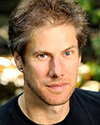
A well-known historian of recent science, biology and biomedicine, Nathanial Comfort began on October 1, 2015 as the third Baruch S. Blumberg NASA/Library of Congress Chair in Astrobiology at The John W. Kluge Center. As Astrobiology Chair, Comfort used the Library’s collections to examine the history of the genomic revolution in origin-of-life research, addressing one of the central areas of inquiry in the field of astrobiology, which in addition to the search for life elsewhere in the universe, is deeply interested in how life began and evolved here on Earth. Comfort is currently a Professor at the Institute of the History of Medicine at The Johns Hopkins University. Read announcement
More about Nathaniel Comfort:
Steven Dick - Second Chair in Astrobiology (2013-2014)
The former Charles A. Lindbergh Chair in Aerospace History at the Smithsonian Institution’s National Air and Space Museum, Dr. Steven Dick is an astronomer, author and historian who served as the chief historian for NASA from 2003 to 2009 and formerly served as an astronomer and historian of science at the U.S. Naval Observatory in Washington, D.C. As Astrobiology Chair, Dr. Dick's research explored the critical issues and optimal approaches to studying the societal impact of the discovery of microbial or complex life beyond Earth. On December 4, 2013, Dr. Dick testified before the U.S. House Committee on Science, Space, and Technology about astrobiology and the search for biosignatures in our solar system. In September 2014, he and the Kluge Center hosted a two-day symposium on preparing for the discovery of life in the universe, and the societal impact of astrobiology.
More about Steven Dick:
David Grinspoon - First Chair in Astrobiology (2012-2013)
A well-known researcher in planetary science, author of "Lonely Planets: The Natural Philosophy of Alien Life," and former curator of astrobiology in the Department of Space Sciences at the Denver Museum of Nature & Science, Dr. David Grinspoon held the inaugural Baruch S. Blumberg NASA/Library of Congress Chair in Astrobiology. As Chair, Dr. Grinspoon used the Library’s collections and resources to research and write his forthcoming book on the Anthropocene Era, which will be a direct result of residency at the Kluge Center. Dr. Grinspoon played an enormous role as an ambassador for astrobiology as Chair, meeting with Members of Congress, delivering several high-profile lectures, appearing in dozens of media outlets including The New York Times, The New Yorker Elements, Air & Space Smithsonian Magazine, The Chronicle of Higher Education, Slate, and Astrobiology Magazine, and hosting a day-long symposium on the longevity of human civilization featuring scientists, scholars, science fiction authors, and journalists with remarks by U.S. Representative Lamar Smith (TX-21) and Director of the NASA Astrobiology Program, Mary Voytek. In 2014 he continued his residency at the Kluge Center as a distinguished visiting scholar.
More about David Grinspoon:
- "Shaping the Future of the Earth: From Inside the Library of Congress" (The Gazette, November 2013)
- Interview with David Grinspoon (Library of Congress blog, November 2012)
- David Grinspoon Named First Chair in Astrobiology
Application Deadline: December 1
Research Areas: Research at the intersection of the science of astrobiology and its humanistic and societal implications.
Eligibility: Open to distinguished scholars worldwide.
Stipend: $13,500 per month (up to 12 months).
News
Applications now being accepted for 2017-2018 Astrobiology Chair
Submit proposals
Luis Campos Named 2016-2017 Astrobiology Chair
More Research
Astrobiology on our blog, "Insights"
Further information:
The John W. Kluge Center
phone: (202) 707-3302
fax: (202) 707-3595
email: [email protected]
Subscribe to our RSS Feed:
News, events, and research
opportunities at the Kluge Center.
Subscribe now
Events
Symposium: "Astrobiology, Synthetic Biology, and the Future of Life"
September 28, 2017
What is life? How might life have emerged on Earth or on other worlds? And how might we engineer the future of life—what might we make life to be? Astrobiologists and synthetic biologists grapple with these questions every day. To further explore the intersections between these sciences and the humanities, the Library of Congress is bringing together scientists, scholars, artists, and journalists for a special symposium on the intersections of astrobiology and synthetic biology.
Symposium: "The Emergence of Life: On the Earth, in the Lab, and Elsewhere"
Septemeber 15, 2016
The emergence of life is among the most compelling questions in astrobiology. This symposium brings together scientists, humanists, and authors to explore what we know about the origins of life, how we came to know it, and what it means.
View event pageSeminar: "The Origins of the RNA World"
March 17, 2016
Four pioneers of science, who have played major roles in developing key models for the origins of life, will be interviewed in a witness seminar-style oral history event.
Read news releaseView webcast
Dialogue: "Stories about Life in the Cosmos: Historical, Cultural, and Artistic Perspectives on Astrobiology"
August 6, 2015
Scholars of English, theatre, and communications discussed stories of human origins and place in the universe, and how new scientific discoveries can reshape those narratives. Part III of the Blumberg Dialogues on Astrobiology.
Read news releaseView webcast
Dialogue: "Rethinking Life on Earth and Beyond: Astrobiology and the Role of Paradigm Shifts in Science and Human Self-Understanding"
May 28, 2015
Scholars discussed how scientific discoveries have disrupted how humans have conceived of themselves throughout history, and how astrobiology may disrupt that yet again. Part II of the Blumberg Dialogues on Astrobiology.
Read news releaseView webcast
Dialogue: "Astrobiology and the Religious Imagination: Reexamining Notions of Creation, Humanity, Selfhood, and the Cosmos"
March 19, 2015
Theologians and scientists discussed how we understand and integrate science as part of our religious worldviews, bringing scholars of Islam, Buddhism, Christian ethics and Jewish studies into the conversation with scientists. Part I of the Blumberg Dialogues on Astrobiology.
Read news releaseView webcast
Lecture: "How the Discovery of Life Beyond Earth will Transform Our Thinking"
October 30, 2014
Dr. Steven Dick delivers his final lecture as Astrobiology Chair summarizing his year-long research at the Kluge Center exploring the potential impacts of discovering life beyond Earth.
Read news release
View webcast
Symposium: "Preparing for Discovery: A Rational Approach to the Impact of Finding Microbial, Complex or Intellgient Life Beyond Earth"
September 18-19, 2014
Scientists, historians, philosophers and theologians from around the world convened for a two-day symposium at the Library of Congress to explore how humanity might prepare to face new knowledge that may challenge our very conceptions of life and our place in the universe.
Conversation: "Astrobiology & Theology"
June 18, 2014
Discoveries of new, potentially habitable worlds beyond our solar system raise challenging questions for humanity in relation to faith, human nature, reality and religion. Astrobiology Chair Dr. Steven J. Dick and theologian Dr. Robin Lovin explore the complex intersection of astrobiology and theology.
Read news releaseView webcast
Discussion: "Searching for Life in the Universe: What Does it Mean for Humanity?"
January 28, 2014
A unique public conversation between the Kluge Center's outgoing and incoming Astrobiology Chairs on what the search for life in the universe means for humanity. Moderated by Joel Achenbach of The Washington Post.
Read news release
View webcast
Lecture: "Terra Sapiens: The Human Chapter in the History of Earth"
October 31, 2013
Dr. David Grinspoon delivers his final lecture as inaugural Astrobiology Chair, summarizing his year-long research at the Kluge Center exploring the Anthropocene Era from an astrobiological perspective and the choices for a wisely-managed planet.
Read news release
View webcast
Symposium: "The Longevity of Human Civilization: Will We Survive Our World-Changing Technologies?"
September 12, 2013
David Grinspoon hosted the Kluge Center's first day-long astrobiology symposium on the longevity of human civilization featuring scientists, humanists, journalists and science fiction authors.
View event page
Read news release
View webcasts
Panel: "The Evolving Moral Landscape: Perspectives on the Environment - Literary, Historical and Interplanetary"
February 28, 2013
Astrobiology Chair David Grinspoon, environmental historian Jean-Francois Mouhot and literary scholar Matthias Klestil explore human perspectives on the environment and the moral implications of those views.
Read news release
View webcast
Application Deadline: December 1
Research Areas: Research at the intersection of the science of astrobiology and its humanistic and societal implications.
Eligibility: Open to distinguished scholars worldwide.
Stipend: $13,500 per month (up to 12 months).
Further information:
The John W. Kluge Center
phone: (202) 707-3302
fax: (202) 707-3595
email: [email protected]
Subscribe to our RSS Feed:
News, events, and research
opportunities at the Kluge Center.
Subscribe now
More
About the Program
The Baruch S. Blumberg NASA/Library of Congress Astrobiology Program establishes a focus in the nation’s capital for the exploration of issues surrounding life’s future in the universe, for humans and other species, on Earth and beyond. The program encourages discussion and reflection on the potential impacts of discovering whether there is life beyond our planet. One senior researcher is appointed annually to be in residence at The John W. Kluge Center, to make use of the Library of Congress collections in exploration of these questions, as well as convene related programs that ensure the subject of astrobiology’s role in culture and society receives considered treatment each year in Washington, D.C.
Astrobiology: The Intersection of the Sciences and the Humanities
Astrobiology addresses three fundamental questions: "How did life begin and evolve?" "Is there life beyond Earth?" and "What is the future of life on Earth and beyond?"
Before the advent of modern science, these questions were largely in the realm of philosophy, theology and ethics. Today, the tools of science are increasingly being brought to bear to address these questions. The NASA/Library of Congress Chair in Astrobiology represents an opportunity for high-level collaboration in understanding the interface between astrobiology and human society.
The Astrobiology Chair creates an opportunity to research the range and complexity of societal issues related to how life begins and evolves, and to examine the philosophical, religious, ethical, legal, cultural and other concerns arising from scientific research on the origin, evolution and nature of life.
Possibilities for research subjects are many. The following are meant to inspire, not to limit creativity: legal issues related to governance of planets and space; the ethical implications of cross-contamination; scientific and philosophical definitions of life; conceptions of the origins of life in theistic and non-theistic religions; comparison of the discussion of these issues in multiple nations and cultures. The Chair may also consider life’s collective future—for humans and other life, on Earth and beyond, examining the impacts on life and future evolutionary trajectories that may result from both natural events and human-directed activities.
The Chair is open to scholars and leading thinkers in the fields of philosophy, history, religion, astrobiology, astronomy, planetary science, the history of science, paleontology, Earth and atmospheric sciences, geological sciences, ethics, or other related fields.
The Setting
Uniquely situated for research, analysis and serious discussion of America’s and the world’s relationship to the Earth, and the moral and philosophical questions of life in the universe, the Library of Congress offers facilities for scholars, universal collections spanning more than 470 languages, broad language and subject expertise of the Library staff, the central position of the Library on Capitol Hill, and the inspiring atmosphere of the magnificent Thomas Jefferson Building in which to annually examine the general subject of the future of life in the universe.
Funding
The Baruch S. Blumberg NASA/Library of Congress Chair in Astrobiology is made possible through a unique interagency agreement between NASA Astrobiology Program and the Library of Congress. Established in 2011, the collaboration by NASA and the Library of Congress owes a great deal to the vision of the late Dr. Baruch S. Blumberg, Nobel Prize winner and founding member of the Library’s Scholars Council. Dr. Blumberg served as the founding director of the NASA Astrobiology Institute in 1999. The funding for the position is provided by NASA, and execution of the agreement is with the Kluge Center in consultation with the NASA Astrobiology Institute.
Application Deadline: December 1
Research Areas: Research at the intersection of the science of astrobiology and its humanistic and societal implications.
Eligibility: Open to distinguished scholars worldwide.
Stipend: $13,500 per month (up to 12 months).
Further information:
The John W. Kluge Center
phone: (202) 707-3302
fax: (202) 707-3595
email: [email protected]
Subscribe to our RSS Feed:
News, events, and research
opportunities at the Kluge Center.
Subscribe now
More
Application Information
Eligibility
Applicants for the NASA/Library of Congress Chair in Astrobiology may be of any nationality and will have achieved distinction in the field of philosophy, history, religion, astrobiology, astronomy, planetary science, the history of science, paleontology, Earth and atmospheric sciences, geological sciences, ethics, or other related fields.
Selection Process
The Astrobiology Chair holder will be appointed on an annual basis by the Librarian of Congress on the recommendation of a selection committee consisting of representatives from the academic community jointly selected by NASA and the Library of Congress.
Tenure & Stipend
The Astrobiology Chair may be in residence at The John W. Kluge Center for a period of up to 12 months, at a stipend of $13,500 per month. The Library of Congress will pay stipends monthly by means of electronic transfer to a U.S. bank account. Transportation arrangements, housing, and health care insurance and costs are the responsibility of the scholar. The Library will provide scholars with information on housing and can provide scholars with contacts for commercial providers of health care insurance. The Library is required to ensure that nonresident alien visitors maintain minimum levels of medical insurance, and will provide information about insurers that offer qualifying policies to nonresident aliens.
Applications
Applicants must submit:
- A completed application form, in English
- A curriculum vitae
- A complete project proposal, including:
- A single-paragraph abstract
- A statement of proposed research (maximum 7 pages)
- An explanation of why the Library of Congress is the appropriate venue for your research
- A detailed plan and budget for proposed outreach activities (see below) - 3 references with completed reference forms
A Selection Committee will consider the application materials in relation to other proposals. Proposals may involve any aspect of astrobiology and its societal or humanistic implications.
Due Date
The annual application deadline is December 1, with the Chair commencing on November 1 of the next year. Application materials must be submitted by the deadline date via the Kluge Center's online application system.
Expectations
The Astrobiology Chair is expected to conduct independent research in astrobiology using the collections of the Library of Congress. The scholar will also convene workshops, public lectures, and other educational and public outreach events and give at least one public presentation at the Library of Congress for the Washington, D.C. area.
This is a residential position, and the Chair is expected to be in full-time residence (for up to 12 months) at the Kluge Center within the Library of Congress while conducting research. The Chair holder will be provided with research space and support in the Kluge Center and is expected to engage in the life of the Center while in residence.
Additional Activities
In order to provide an opportunity for the questions raised by astrobiology to achieve greater public visibility, the Chair holder will organize workshops, symposia, small conferences or other activities that engage the broader academic community and the public. The Chair will be responsible for the intellectual content of such events; the Kluge Center will provide guidance and logistical support.
Budget Proposals
Applicants should include as part of their proposal detailed plans and a budget (no more than three pages) for such auxiliary activities as workshops, symposia, or small conferences, explaining how these activities would support the research and/or contribute to any public presentation of the human implications of astrobiology.
For purposes of contemplating budgets for such activities, some relevant costs and fees associated with these kinds of events held at the Library are listed below. These are only base figures to help applicants in thinking about the details of such auxiliary activities:
- The Library of Congress can accommodate conferences and small workshops up to about 180 people and lectures up to 480.
- There is no charge for use of the rooms by a scholar associated with the Kluge Center.
- A small event for 25 people for one day (approximately 8:30 a.m. to 4:30 p.m.), ranges from approximately $1,200 - $1,700.
- Funding may be used for travel, hotel, honoraria and per diem costs. Please refer to the GAO website for estimates. Funding may not be used for food served during an event.
Contact Information
Completed application packets should be submitted via the Kluge Center's online application system. Applications submitted via email, fax, or regular mail will not be considered. For questions about application procedures, eligibility, stipend or deadlines, please email [email protected] or write to us at:
The NASA/Library of Congress Astrobiology Program
The John W. Kluge Center
Library of Congress, LJ-120
101 Independence Avenue, SE
Washington, DC 20540-4860
Application Deadline: December 1
Research Areas: Research at the intersection of the science of astrobiology and its humanistic and societal implications.
Eligibility: Open to distinguished scholars worldwide.
Stipend: $13,500 per month (up to 12 months).
Further information:
The John W. Kluge Center
phone: (202) 707-3302
fax: (202) 707-3595
email: [email protected]
Subscribe to our RSS Feed:
News, events, and research
opportunities at the Kluge Center.
Subscribe now
More

